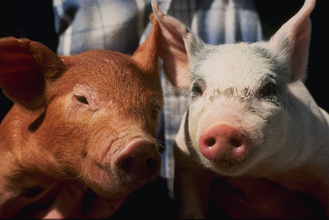|
Half of all antibiotics used globally are used in agriculture, according to the WHO (Ref?). Total antibiotics use in the UK is about 1,225 tonnes annually: 38% is used in human medicine, 25% for pets and horses, and 37% in farm animals. Calves and broiler (meat) chickens are regularly given growth promotors. Dairy cows, laying chickens are routinely given antibiotics for disease control. Pigs have antibiotics for both disease prevention and growth promotion. The use of antibiotics in intensive UK livestock farming increased by up to 1,500% in 30 years and the use of penicillin increased by 600%, according to Soil Association 1998 Report. There is a more complete List of antibiotics used in farm animals and associated resistant bacteria. The EU Commission requires all Member States to test food of animal origin for the presence of residues of licensed veterinary medicines. Member States are required to ensure that residual concentrations of legal medicines fall within internationally accepted norms. (MRL link?) Member States must ensure that food of animal origin does not contain residues of unauthorised substances, which should not be present at any concentration in the food that we eat. In the UK, the Veterinary Products Committee in 1999 made several recommendations that included reduction in the routine dosing with antibiotics and phase out their use as growth hormones Antimicrobial Use in Farm Animals.
|
© 2003 EP@W Publishing Co Ltd
Photos courtesy of http://www.usda.gov


